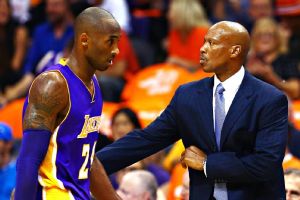 Byron Scott’s motto should totally be, “Why have three when you can have two?”
Byron Scott’s motto should totally be, “Why have three when you can have two?”
The Los Angeles Lakers head coach has a well-documented and iffy relationship with the long ball. He’s on record as doubting the impact of three-pointers on championship teams.
Ahem:
I asked Lakers coach Byron Scott about his philosophy on 3-pointers. "I don't believe it wins championships. (It) gets you to the playoffs."
— Baxter Holmes (@BaxterHolmes) October 17, 2014
One season and 61 losses later, things haven’t changed much.
Per the Orange County Register‘s Bill Oram:
Byron not budging on controversial 3-pointers philosophy. "I still don’t necessarily think it’s going to help you win a championship."
— Bill Oram (@billoram) April 16, 2015
Basically, Byron said 3s are fine, but teams need to have post-up presence to command double team.
— Bill Oram (@billoram) April 16, 2015
Bruh.
The Lakers ranked 25th in three-point attempts (18.9) and 17th in three-point percentage (34.4) this past season. So, true to Scott’s offensive ideals, they didn’t shoot a ton of threes. They shot some, but not a truckload.
Oh, they also ranked 24th in offensive efficiency, scoring a boring 103.4 points per 100 possessions, according to Basketball-Rerence, a standing that’s bolstered by some early-season mediocrity that didn’t encapsulate the tanktastic outfit they eventually became.
Is Scott married to that kind of basketball?
Hell yeah. Why wouldn’t he be? Crappy offense? Sixty-plus losses? The Lakers clearly have a recipe for offensive success in place, even if their players and performance don’t reflect it.
Besides, do winners actually shoot threes?
Oh.
Per The Wall Street Journal‘s Chris Herring:
Byron: "I still don't think 3-pointers help win you a title." He says this as 12 of the 16 playoff tms shot an above-avg number of threes.
— Chris Herring (@HerringWSJ) April 16, 2015
Look, Scott doesn’t seem to actually despise threes. But he and the Lakers have to get with the program. The NBA is a floor-spacing league now. The days of allowing Kobe Bryant to sap 10-plus seconds off the shot clock only to settle for a contested mid-range jumper are over.
So too are the days of Shaquille O’Neal. The NBA isn’t a ground-and-pound entity anymore, either. You find another big like Shaq, then we’ll talk. But contemporary bigs are the Anthony Davises and Kevin Loves. They can post-up, sure. But they predominantly face-up and can hit jumpers, oftentimes even—you guessed it—threes.
The sooner the Lakers accept this, the sooner their rebuild can actually begin. Until then, they’re in flux, losing and conserving cap space, trying to balance exceedingly high and hopeful instal-turnaround expectations with reality—the reality being that, no matter how much talent they get, their offensive model won’t fix itself.



















